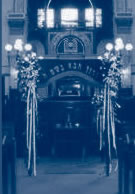|
SEDRA : Mishpatim Hertz Chumash p .306
Exodus Chap. 21 verse 1
This week's Sedra is generously sponsored by Jeff Pura.
SYNOPSIS
Mishpatim - Judgements, introduces a great proportion of
the Torah's legal corpus given at Sinai.
The institution of slavery as understood in the ancient world
is radically reformed into a form of restitution for theft
or 'bankruptcy'.
"Slavery" is indeed an inaccurate translation or
description of a system in which the subject possesses basic
rights to his person, property, family and eventual freedom.
A Jew may be a slave for a maximum of six years. The master
must support a married slave and his Jewish wife & children
during his service. However, a non jewish hand maiden given
him by the master remains with the master.
A slave who insists on remaining in servitude after six years
is to have his ear pierced against the doorpost of the house
and must be freed in the Jubilee Year. A man's daughter sold
into service may be redeemed by relatives if she displeases
her master. If the master's son marries her she is to be treated
as free born. She is entitled to freedom if her husband marries
another woman or if her marital rights are infringed in any
other way. Fatal injury to a slave by the master is a punishable
crime and maiming him leads to immediate freedom.
Capital offences include intentional murder, cursing parents
in the name of G-d, kidnapping, witchcraft, bestiality and
idolatry.
Injury to another leads to liability for the victim's loss
of earnings, medical costs, pain, embarrassment and physical
impairment. Further actions in damages are enacted for injury
to a pregnant woman and the loss of the foetus. Damages caused
by one's animals, property or actions incur liability for
compensation. The method of assessing damages is described.
The laws governing damages or theft to the property of another
held in one's possession in trust, as a deposit, borrowed
or hired are detailed. Theft.
Fines of fivefold and fourfold are enacted for theft and slaughter
of livestock and twofold damages for being found in possession
of stolen livestock. The conditions of justifiable homicide
in robberies are set out.
Laws of Morality and regulations against oppression are legislated.
Wronging the stranger (convert), orphans, widows or anyone
who is vulnerable will invite G-d's anger. Oppression in business,
especially of the underdog is forbidden. The perversion of
justice through false evidence, biased judgement and bribery
is viewed as the greatest danger to the survival of a civilised
society.
Assistance to one's fellow, even a rival, is a sacred obligation.
Lost property must be restored to the owner. Animals must
not be caused or allowed to suffer. This applies especially
to beasts of burden.
First fruits and first born animals are to be dedicated to
G-d.
Other laws include the prohibition of Trefah (meat of an
animal torn by beasts). During the Sabbatical year sowing
and reaping of the land is forbidden.
Shabbat abstention from work is to be observed by all members
of the household, including animals. Pilgrimage to the Sanctuary
by every adult Israelite three times a year on Pesach, Shavuot
and Succot to bring offerings is decreed. It is forbidden
to seethe a kid in it mother's milk. Hashem's assistance in
the conquest and settlement of the land is promised in return
for faithful adherence to all these laws.
Moses descended from Mt Sinai having written down all the
precepts conveyed to him by G-d, offered up sacrifices and
read the Book of the Covenant to the people who instantly
committed themselves to it : "All that G-d has spoken
we will do and we will hearten". After witnessing a mystical
vision of the Divine Glory together with Aaron, Nadav, Avihu
and the seventy Elders, Moses is summoned to ascend Mt Sinai
alone to receive the Tablets of Stone.
HAPHTORAH : Shekalim II Kings Chapter 11 verses 17 - 20,
Chapter 12 verses 1 - 17.
The theme of the haphtorah relates to the special maphtir
in that they both deal with the subject of purification. "How
Israel is to emerge from the grave of Exile, of undefiled
service of G-d".(Hertz)
TELL ME RABBI...
Haphtorah - The Prophetic Portion The portion from the Prophets
read immediately after the reading of the Torah on Shabbat,
Rosh Hashanah, Yom Kippur, Pesach, Shevuoth, Succot, Tisha
B'av and on the fast days quite often refers to events or
topics which occur in the Sedra of the Day.
This week we read the special Haphtorah of Shekalim, linked
to the special Maphtir. The origin of the Haphtorah is uncertain
but, in all likelihood, the custom originated in the desire
of the sages that passages from the Prophets as well as from
the Torah be read (and interpreted) at public services.
At first, no set passages were prescribed but later, when
the sages selected definite portions from the Prophets for
all Shabbatot and Holy Days, they were guided by the general
principle that the Haphtorah should contain a reference to
some event or theme mentioned in the Torah section previously
read.
In some instances, the Prophetical portion was chosen because
its contents were considered specially fitting for that particular
day - such as today - Rosh Chodesh.
The Haphtorah is sung in a distinctive chant of its own by
the last person called to the reading from the Torah which
must be read from the handwritten parchment scroll. The Haphtorah
may, and usually is, read from a printed Tanach. In some congregations
the Haphtorot and all Megillot are read from scrolls similar
in appearance to Meggillat Esther and are often called the
"Navih".
BACK TO SHABBAT SHALOM
TABLE
|








